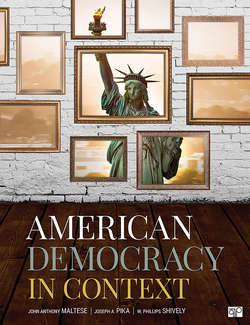Читать книгу American Democracy in Context - Joseph A. Pika - Страница 111
На сайте Литреса книга снята с продажи.
Gibbons v. Ogden (1824)
ОглавлениеIn Gibbons v. Ogden, the Marshall Court again ruled in favor of broad national power, this time in relation to the commerce clause of the Constitution (Article I, Section 8). Now the debate focused on how broadly to read the enumerated powers of the commerce clause, which gives Congress the authority to regulate interstate commerce. But what, exactly, does this authority entail?
commerce clause Article I, Section 8 of the Constitution, which gives Congress the authority to “regulate Commerce with foreign Nations, and among the several States, and with the Indian Tribes.”
Dual federalists believe the commerce clause gives Congress only those powers essential to regulating the trade of actual goods and commodities among the states. Therefore, Congress’s power is largely limited to regulating the transportation of these goods and commodities across state lines. Cooperative federalists believe the commerce clause gives Congress the authority to regulate anything that has even an incidental effect on interstate commerce. Thus, in the twentieth century, cooperative federalist interpretations of the commerce clause expanded Congress’s power to include regulation of the workplace (including the passage of minimum wage laws and maximum hour laws), which dual federalists insist should fall to states under their police powers.
Gibbons v. Ogden set an early precedent for a broad reading of commerce clause power. The case dealt with whether navigation and the transportation of people (rather than of goods and commodities) across state lines were subject to regulation by Congress. Why did this become a question? Aaron Ogden operated a steam-powered ferryboat between New Jersey and New York. The state of New York controlled who could navigate in those waters, and Ogden operated his boat with a state-sanctioned license (part of a steamboat monopoly). Soon thereafter, he faced competition from another ferryboat operated by Thomas Gibbons. Instead of a state-sanctioned license, Gibbons had a federal license granted to him by Congress. Unhappy with the competition, Ogden obtained an injunction from a New York state court to prevent Gibbons from operating his steamboat without a state-sanctioned license. Gibbons appealed, arguing that a license from Congress trumped a state-sanctioned one.
Description
Even in the nineteenth century, the waterways around New York City were bustling, making control of ferry service across the Hudson a contentious issue.
In an opinion again written by Chief Justice Marshall, the Supreme Court embraced the broad interpretation of Congress’s commerce clause power and determined that Congress did have the power to issue the license.23 Having concluded that Congress had the power to regulate navigation—not only the transportation of goods and commodities—and thus to issue the license to Gibbons, the Court then used the supremacy clause to conclude that New York State could not grant a steamboat monopoly that would render that license void. To do so would interfere with Congress’s commerce clause power.
Again, this broad interpretation of the commerce clause has had profound long-term consequences. It paved the way for post-1937 rulings by the Supreme Court that allowed Congress to use the commerce clause to pass legislation dealing with everything from minimum wage laws to racial discrimination in restaurants.
